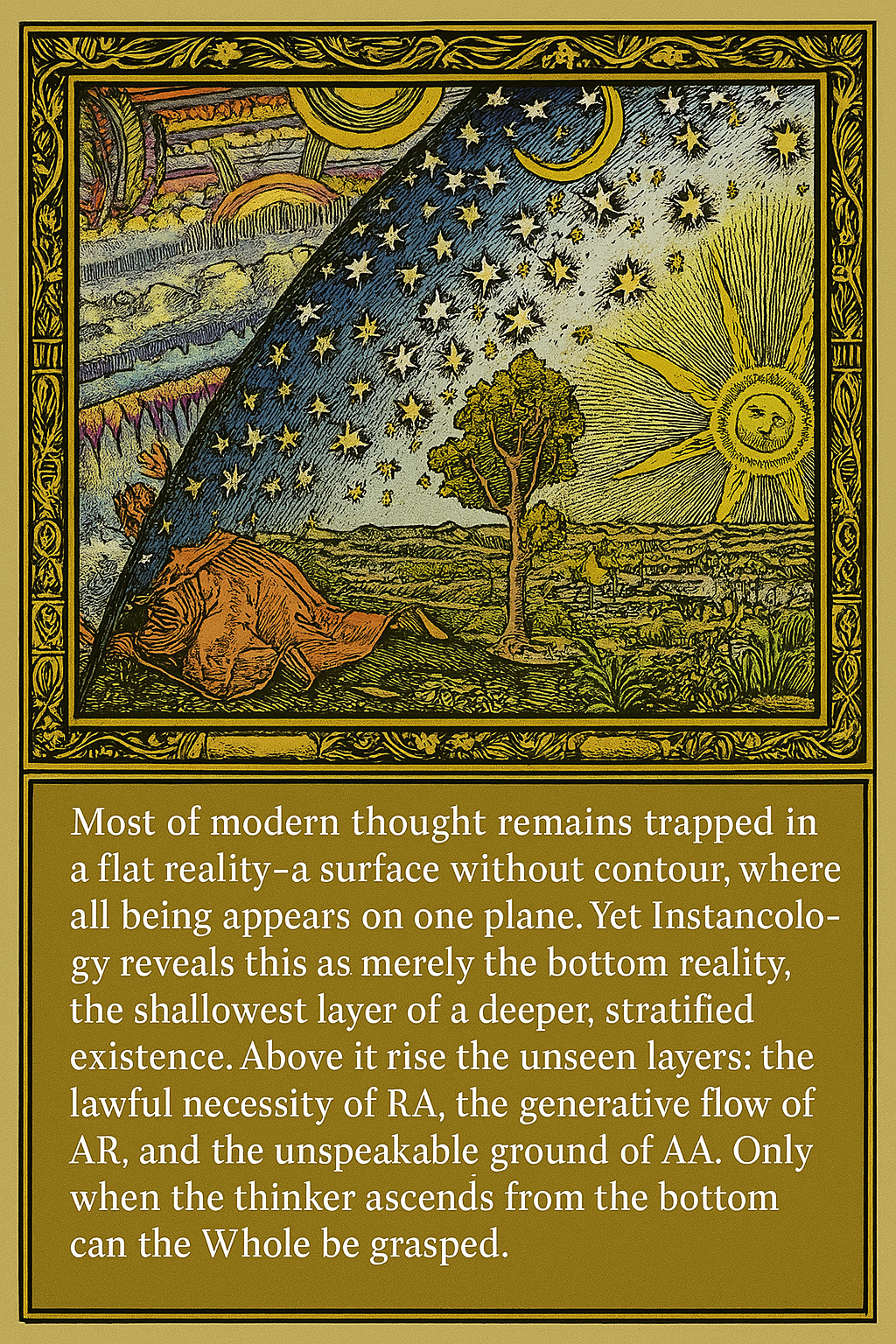On the limits of proof
On the Limits of Proof: From Cogito to Reality, and from Reality to the Absolute Absolute
Abstract
This essay explores the philosophical challenge of moving from Descartes’ famous axiom “Cogito, ergo sum” to the existence of an objective reality, and further from that reality to the existence of an Absolute Absolute (AA). After careful reflection and dialogue with various artificial intelligence systems, the conclusion is drawn: the step from Cogito to reality is weak but philosophically possible, while the step from reality to AA is not logically possible in the classical sense. This essay explains and defends that conclusion in two stages, drawing from both classical philosophy and the newer framework of Instancology.
I. From Cogito to Reality: A Weak but Possible Bridge
Descartes’ famous dictum—“I think, therefore I am”—is universally acknowledged as a foundational truth in Western philosophy. It asserts that the very act of doubt confirms the existence of the thinking subject. This axiom is purely subjective, concerned solely with the self’s awareness of its own thinking process.
However, to move from this internal certainty to the existence of reality outside the self is a leap that requires philosophical scaffolding. The Cogito alone does not affirm that the external world exists—it only proves that something is thinking. This leaves open the question of solipsism, where the self might be the only thing that exists.
Yet, the move from Cogito to reality is not entirely unjustified. Several philosophical traditions attempt this bridge:
- Phenomenology (Husserl) emphasizes that consciousness is always “intentional”—it is always of something. Even in hallucination or dream, the mind posits objects, thereby revealing a structured engagement with what appears to be a world.
- Kantian transcendental idealism argues that the categories of space, time, and causality are a priori conditions for experience. Without them, consciousness would be chaotic and unintelligible.
However, this move is still weak in a strict logical sense. It does not prove reality exists in an ontological sense, but rather in a functional or phenomenological sense. Still, many thinkers accept that the leap from Cogito to Reality, while not deductively necessary, is philosophically reasonable—a kind of transcendental assumption required for any further discourse.
II. From Reality to the Absolute Absolute: A Logical Impossibility
If moving from Cogito to reality is difficult, moving from reality to the Absolute Absolute (AA) is categorically impossible within the structure of logic or empirical thought.
The Absolute Absolute, as developed in Instancology, is not a being, thing, or cause—it is the undefinable source or condition of all existence, including both mind and reality. It lies outside time, space, causality, and language. It is not a part of reality but the condition that makes reality possible.
Philosophically, the attempt to derive the Absolute from reality involves several fallacies:
1. Category Error
2. Epistemic Barrier
3. Ontological Priority
4. The Fallacy of Totalization
Thus, rather than try to “prove” AA, the correct metaphysical move is to acknowledge its logical necessity—not as a conclusion of reasoning, but as the anchor without which nothing else makes sense.
Conclusion: Why Trust the Absolute Absolute (AA)?
The journey from Cogito to reality remains a philosophically fragile yet navigable path. However, the leap from reality to the Absolute is not logically achievable within the bounds of reason, perception, or scientific inference. The Absolute Absolute (AA), as posited in Instancology, cannot be derived from empirical data or logical chains.
This raises a final and critical question:
If AA is not provable, why should anyone trust it as the unique and true origin of the world instance, instead of other metaphysical hypotheses—such as God, chaos, substance, multiple principles, or simulation theory?
The answer lies not in faith, nor in proof, but in a third category: logical necessity stripped of anthropocentric or mythological projection.
1. AA is Unconditioned, Unlike All Competing Systems
2. AA Cannot Be Compared—Because It Cannot Be Defined
3. AA Is Not a Belief but an Anchor
AA is not provable—but without it, proof itself becomes impossible. The very act of questioning presupposes a reality in which questioning can occur. The reality presupposes a structure in which mind and world interact. That structure must itself be grounded—not in another structure, but in the groundless ground: the Absolute Absolute.
So the choice is not between AA and a better-defined metaphysical system. The choice is between:
- A coherent metaphysics that grounds all conditions in the necessity of an undefinable Absolute, or
- An infinite regress of relative explanations, each dependent on a deeper unproven layer.
In that light, AA is not a belief to be compared. It is the logical inevitability of all comparison. And thus, it earns trust—not by force, faith, or fame—but by standing silently and absolutely beneath all that exists.
